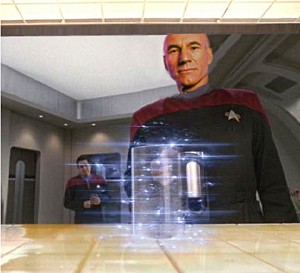“The economics of the future is somewhat different. You see, money doesn’t exist in the 24th century… The acquisition of wealth is no longer the driving force in our lives. We work to better ourselves and the rest of Humanity.” Jean Luc Picard
A world without money and paid work is, of course, pure science fiction, socialist-seeming, nonsense. Except that future is already here, at least partially. We know because we’re already living a variation of that future along with a growing rank of others.
But before we get to that, a little introduction is in order.
Last year we spent this day giving thanks for how much better the present is than the past (seriously, the “good old days” actually blew). Today we’re spending Thanksgiving thinking about how much better the world is becoming than it already is.
And if we were inspired to write last year’s Thanksgiving Day retrospective by thoughts of superhero superpowers it seems fitting that Star Trek inspire today’s forward-looking post.
As travelers we’ve long envied Picard and Kirk for their transporters. The ability to pop anywhere in an instant is the holy grail of anyone who has ever squeezed into a coach class seat. But it occurs to me that teleportation is far more than that. The technology doesn’t just change how we’d get from place to place (no more L.A. traffic, yay!), it changes everything. In fact, it makes the economy described in Picard’s quote not only possible, but seemingly inevitable.
How? By ending scarcity.
Money becomes pointless after a point
Without going too deeply into the nerdy weeds or sticking strictly to the Star Trek canon, the teleporter is basically a technology for replicating physical things. It converts stuff to energy and then reassembles it someplace else. But once you have that ability there’s no reason you’d need to return things back to their original form. If you can transform a rock into energy and back into a rock and if you can do the same thing with an iPhone you can certainly turn your rock into an iPhone; or a turkey dinner; or anything else of basically equivalent mass. It is 24th century alchemy where one can transmogrify anything into anything else.
With that technology widely available (and it would be widely available because, one assumes, there’s nothing to prevent replicating replicators) Picard’s statement makes perfect sense. No one works for money in the 24th century because money is pointless. Once everyone can turn a lump of sand, or an old chair, into diamonds or whatever else they want money loses all value (so too do diamonds, by the way.) There is no longer any reason to work for cash because everything can be had without it.
Instead of striving for money and possessions, you would find other sources of motivation. Perhaps you’d be drawn to the prestige of being a Starship Captain or the acclaim of discovering new scientific advances. Maybe you have more modest ambitions and you’d spend your time gallivanting around the universe sharing your experiences on a travel blog. Whatever your personal calling, it would have nothing to do with making money or acquiring things. As Picard says, you’d work at bettering yourself and humanity.
They have more but we have more than enough
Now turn, for a moment, from Picard’s world of absolute overabundance to the real world of mere abundance. Today the world easily produces more than enough food to feed its population. We easily manufacture enough clothing and shelter, too. We’re terrible at distributing those things, but we produce more than enough.
When measured against our true needs for shelter, clothing and food, most of us in the developed world enjoy a pretty significant surplus. We live in houses larger than necessary, spend more on fashion than is required, and consume far more food than is even healthy for us.
Unlike Picard, we can’t have everything we want. But we certainly have more than we need.
Beyond some base level of comfort, we chase, consume and work for things not because we have to. We do it because we want to. There’s nothing wrong with that. But it’s important to recognize that it is a choice. We don’t need to work more hours to afford an extra 1,000 square feet of living space any more than someone needs to work in the future Star Trek envisions. They work entirely because they want to while most of us work more than we need to. The difference between us and them doesn’t seem so great after all.
And those differences are narrowing every day. It used to be that “good jobs” required us to work a specific number of hours each day on specific days each week. But technology is increasingly upending that old relationship as well. A growing amount of work is now done remotely on a consulting basis.
The 40+ hour work week is becoming an archaic tradition
Now, instead of getting paid to show up at an office for a set number of hours, people are being paid to deliver a specific project. How many hours you work isn’t predetermined. You work as long as it takes to get the job done. No more. No less. That arrangement creates never-before-possible opportunities for managing your “work/life balance.”
If you do your best work at three in the morning on Sundays, you can do that. If you prefer cities or rural mountain tops far from civilization, go work there. If you need or want more money, take on more projects. If you’d prefer more free time to spend pursuing uncompensated interests, take on fewer projects.
The dynamic here is that in our emerging freelance economy we have the freedom to tailor both our income and our expenses to achieve whatever balance we desire. We can choose to consume more and sell more of our hours each day to pay for that consumption. Or we can choose to work and consume less and live a life closer to the one described by Captain Picard in the opening quote. The choice is yours.
The wonderful thing about good science fiction is that it lets us imagine a plausible future that we can either aspire to or take caution from. To its great credit Star Trek charted an inspirational course with astounding vision. It aired the first-ever televised interracial kiss just six months after the assassination of Martin Luther King Jr. and predicted Siri before Steve Jobs entered high school.
Today it is helping us imagine a future economy where paid work is a thing of the past, or at least one where it is increasingly optional. With a little vision of our own it’s not too difficult to see that economy already taking shape. All we need now is the will and the imagination to capture that future for ourselves.
————————-
Related articles discussing how to build that 24th century lifestyle today:
A world without work
How to create a mobile freelance business
How to revolutionize your financial life























And you don’t take into account nanotechnology, which is real, and can be fully operational in 10 or 15 years, not in the 24th century. Specifically molecular manufacturing [its complete science has been already designed, and we are working on its practical implementation]. This technology won’t just change the economy as we know it today, but destroy it into pieces. And its direct consequence is that people do not have to work. So the real question is: Would be the owners of these large molecular manufacturing systems willing to feed billions of humans who have nothing to contribute? Would we make it?
Great post and happy Thanksgiving!
LikeLike
Yup, there’s lots of paths to the same destination. Depending on how it’s imagined, molecular manufacturing can get you to exactly the same kind of economy envisioned in Start Trek or a completely dystopian one. The critical distinction, I think, is whether the technology actually ends scarcity. That is, does your nano-factory still require specialty inputs or can it manufacture anything you want from anything available? In the latter case, I don’t think there would be owners of the technology (at least eventually) because even the idea of “ownership” loses all meaning in a world without scarcity. The former case, however, likely results in a world of even greater inequality than we have today.
LikeLike
From my view there is only one: a dystopian scenario.
This is not the place to explain molecular manufacturing (MM), as it will take several pages and it’s also well explained here: http://www.crnano.org/timeline.htm .
Regarding owners of the technology you may understand better with an analogy: Today you can afford buying a FORD, something unthinkable in 1908 and that only the elite at that time could afford. That doesn’t mean, in any sense, you are owner of FORD Motor Company, nor that you have access to their technology. Mr. Henry Ford, along twelve investors, built his first factory, and today FORD Motor Company still belongs to an elite. With nanotechnology will be the same. In the last 11 years, some governments around the world have invested more than US$67.5 billion in nanotechnology funding. When corporate research and various other forms of private funding are taken into account, nearly a quarter of a trillion dollars will have been invested in nanotechnology by 2015. These are the owners of this technology.
On other hand a technology that can create tiny manufacturing self-replicating systems that might run amok and ‘eat’ the biosphere, reducing it to copies of themselves (Grey goo) cannot afford a criminally irresponsible misuse. In other words should be strictly controlled by the elite.
Finally, let’s say a nano-Ferrari production cost would be $ 5… that means that a Ferrari built by actual means would be economically unviable, so workers around the world won’t be necessary anymore. Beside some artists and scientists, the rest of humanity would be useless, but still would need to be feed everyday. At this point, what the elite would do?
I post a long article about this issue in my blog you may enjoy: http://damantigui.wordpress.com/2013/11/16/just-around-the-corner-en/
Thanks for your answer!
LikeLike
Hi Dugutigui,
I understand. But what you’re describing is a world still constrained by scarcity. Meanwhile the Star Trek universe has no such constraint. Nor would a universe in which we have the ability to rearrange atoms of existing things at will.
It might help to ponder a simple question. If instead of building automobiles, Henry Ford invested his fortune building a machine that could make anything he wanted out of anything available. He’d instantly be able to replicate anything in the world. He’d be wealthy without measure or end. What would he then do?
Would he keep the technology for himself? For what purpose? To profit? No, he wouldn’t because he can already manufacture anything he wants at no cost. Money and profit for him have become meaningless terms. He’d have no reason to withhold the technology. And even if he wanted to out of pure spite, it’s questionable how long he could maintain exclusivity. The world would always be just one pirated copy away from making it available to everyone.
Once that happened, there’d be no “elite” (at least as measured in material terms) and there’d be no ownership in any meaningful sense because everyone could have everything they wanted – if you take my gizmo I’ll just replicate another one. But because you can replicate your own, why would you ever need to take mine?
As interesting as this all is, it’s also a bit of a detour from the intent of the post which is more about what we do with the surplus we already have. Do we use today’s riches to accumulate an ever growing pile of things or do we spend some of our abundance to buy back the hours of our lives. That is the truly interesting question I wanted to explore.
LikeLike
Reblogged this on digger666 and commented:
While tantalisingly close to “From each according to their ability; to each according to their need”, this piece correctly describes what is possible this very day, given the will. What it fails to recognise is the reality that most people still need to work, and they need to work very hard to scratch a living among plenty. That situation will continue so long as our oligarchic rulers continue to wield power and their politician servants continue to “mediate” that exercise of power. Per capita productivity has grown exponentially while the capital wealth accrued as a result has be expropriated by those who continue to wield that power. It will take more than further advances in technology to alter that equation.
LikeLike
Hi Digger,
We don’t deny that many folks “work very hard to scratch a living among plenty.” But we’d still challenge anyone in our middle class to substantiate that claim objectively. We’d note that real mean individual income has more than doubled in the the U.S. over the last 50 years (see link below.) With that fact in mind, we ask the following question: If the average American were willing to live a 1950’s lifestyle today could they work half the number of hours they currently do and live on half the income? If not, why not?
(http://www.russellsage.org/sites/all/files/chartbook/Income%20and%20Earnings.pdf)
LikeLike
I love Star Trek…and I love the ideas you’re talking about here, but (to my shame) I’d never put them together before. Science fiction as a force for social change is something that blows my mind, and I love it. Well done!
LikeLike
We sometimes aspire to be thought-provoking and, failing that, at least original. So we take your comment as a high honor. Thank you.
LikeLike
Great post! 🙂 And the teleporter is something that we all should have. Happy Thanksgiving!
LikeLike
Agreed.
LikeLike
“We can’t have everything we want. But we certainly have more than we need.” This is really true for many of us, and I very much appreciate the perspective you share and the hope it brings for my own future. Digger666 brings up a good point, too. While many of us have more than we need and still want more, there are some who still can’t get all they need in the first place.
LikeLike
What you say is true. And we considered this potential criticism while writing the piece but decided to go ahead with the general theme for a variety of reasons.
1) We’re a blog dedicated mostly to full-time travel. Any advice we could possibly give on our main topic is subject to the criticism that “not everyone can afford” to do whatever we’re suggesting they do. We admit that you need some resources to do what we’re doing. An unfortunate truth is that not everyone can muster those resources.
2) Having said that, people really do have the ability to achieve far more than they think possible. While we acknowledge some folks face truly insurmountable obstacles, we think those situations are far rarer than anyone wants to admit. If you look around the world you’ll find no shortage of examples of people doing incredible things while overcoming obstacles we can’t even imagine enduring. If they can do it, why not us?
3) We also want to challenge people to think differently. There is never enough money in the world. Nor is there enough time. Popular culture largely encourages us to trade the latter for the former. We’d like to encourage more people to evaluate whether that is really a wise trade.
LikeLike